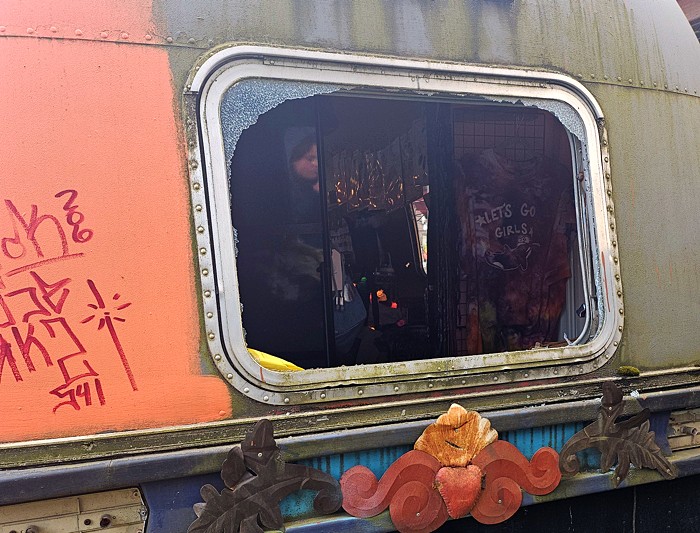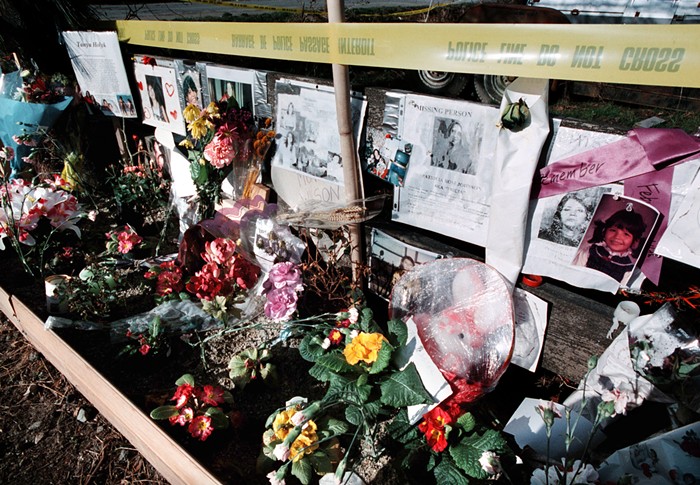At the end of January, Capitol Hill vegan restaurant Life on Mars started cataloging on Instagram the woes of existing as a small business in Seattle. A random passerby had thrown a rock through their window. Someone lit a fire on their patio. Someone else threw a rock through the restaurant’s door. There was graffiti, drug use, and even stolen plants.
“We have to consider what we are even doing here anymore,” the restaurant posted on Jan 25. “Good times.”
About a week after that post, the restaurant launched its “Mayhem Fund,” a GoFundMe that promised to fight the forces of evil plaguing Seattle’s small businesses. How? By asking customers to give them donations in the specific amounts of $20, $50, $100, $200, or $500. KOMO covered the creation of the fund, which fit perfectly into the station’s breathless coverage of cannabis store robberies and the booming glass repair industry.
But tucked below one of the restaurant's posts from Jan 23, two separate people mentioned Settle’s Storefront Repair Fund, a program to help businesses struggling with broken windows. Life on Mars responded to one of the people who suggested the program, noting the grant covered just $2,000. “We applied. We’ve spent over 25k to fix the break ins,” the account wrote, followed by a shrugging guy emoji.
The City announced the Storefront Repair Fund at the end of October 2022 and told businesses the $2 million program could reimburse them up to $2,000 for certain property damages, such as broken windows, broken doors, broken locks, and etchings on windows. Businesses could apply for up to two grants for damages that occurred after January 2021.
However, despite what Life on Mars wrote on Instagram, the business never applied for a grant from the city, according to co-owner Leigh Sims and City records. When I asked Sims about why they didn’t use the program, she first said the grants didn’t exist when the restaurant started the Mayhem Fund. When I corrected her, she acknowledged the program did exist, but she didn’t know much about what happened. She did say the restaurant had a paperwork issue with its police report, but the storefront fund doesn’t require a business to submit a police report.
In any event, Sims said the Mayhem Fund dollars went toward expenses that insurance didn’t cover, but she didn’t name those costs. She also declined to say how much they raised, though the restaurant’s website says they’ve received tens of thousands of dollars in donations.
While Life on Mars cashed in on the TV news narrative about the plight of small businesses in crime-riddled Seattle, other businesses took advantage of the fund. Since launching the grants, the City has approved more than 360 applications, divvying out about $720,000 in reimbursements. Most of those funds went to downtown businesses and shops in the Chinatown-International District, but other top neighborhoods included Wallingford and Fremont.
Due to some feedback from applicants about difficulties applying for the program, the City plans to relaunch the application in late summer to make it easier for more businesses to access the remaining $1.2 million, said Erika Lindsay, a spokesperson with the Seattle Office of Economic Development. Businesses I spoke to that received the funds had an “every bit helps” attitude toward the grant program, which acknowledged the $2,000 limit often failed to cover the full cost of serious break-ins.
Businesses understandably complain about theft and property destruction. Lately, those concerns have translated into some of Seattle’s small businesses and associations pushing for more cops on the streets. But no one can definitively claim that hiring more police results in lower crime rates and fewer break-ins.
People who study the issue can’t say whether larger police departments and budgets reduce crime rates. Moreover, even if we put a cop on every block, an arrest after the fact wouldn't suddenly make a busted business whole. Courts can tell defendants to pay restitution, but that order comes at the end of the criminal justice process and assumes the convicted person can pay. If the crime stemmed from poverty or untreated mental illness, which is often the case, then the money just isn’t there.
Other cities offer more robust storefront repair and security improvement funding. In Seattle, businesses that qualify for the storefront grants must employ fewer than 50 people, not exceed more than $7 million in annual net revenue, and have been open for at least two years prior to October 2022, among other stipulations. By contrast, a similar storefront program in Chicago provides grants of up to $150,000 to businesses with up to 200 employees and annual sales of up to $9 million. In San Francisco, the city started lending out its public works department to provide graffiti abatement to businesses in certain commercial neighborhoods.
Though most businesses have insurance to cover damages when someone steals something or crashes through a window, their plans don’t always cover all costs or the cost to increase store security. And business owners I spoke to said they worry about making too many insurance claims, which could cause their insurance company to drop them or increase premiums, so they welcome government assistance.
Business owner Mikaela Wingard-Phillips echoed concerns from other owners about reporting thefts to insurance and the gap between what insurance covers and actual revenue loss. She dealt with months of repeated break-ins at her family’s Maple Leaf store, Math ‘n’ Stuff, with people smashing the store’s skylight and drilling through its emergency door.
Though cops always respond to her calls, she doesn’t think more officers would prevent the break-ins. Plus, even if cops recover her stolen merchandise, they can’t return it to her because she can’t prove the stuff belongs to her unless she invests in expensive security tags.
Math ‘n’ Stuff received a storefront repair grant from the City, which Wingard-Phillips said helped. Rather than hope to recoup all her losses after a burglary, she said she prefers to find ways to keep people from getting inside in the first place. She added metal bars to the windows and upgraded the store’s deadbolts. In total, with damages and security upgrades, the store spent more than $20,000, she said. The $4,000 went a little ways, but to help with the costs, a customer ended up launching a fundraising page.
Washington Retail Association Senior Vice President of Policy and Government Affairs Mark Johnson said members have started talking about ways local governments can help their businesses, aside from hiring more police. Some of the ways businesses prevent theft include adding structures to prevent people from driving cars into windows, such as a giant concrete ball or a pillar.
In Olympia, state Senator Karen Keiser (D-Seattle) sponsored a bill to fund grants for physical security improvements for cannabis businesses, along with funds for an organized retail theft task force. The bill died in committee, but Johnson said he expects it to return next session.
Other places have had more success on that front. In March, Vancouver, B.C., launched a grant program for businesses to help pay not just for damages but also deterrents and security improvements, including anti-graffiti coating and broken window repair. In the release about the announcement, the city acknowledged the factors that cause crime come from complex, systemic issues, and an easy solution to fix those issues doesn’t exist. But, the city could offer financial support for the businesses managing the consequences of these issues.
Instead of Seattle leaders making promises to hopefully hire more cops at some point in the future, the City could look at how other cities provide grants for theft deterrence structures and technology, loan out public works crews to help with graffiti abatement, and maybe expand Seattle’s own soon-to-launch victim compensation fund pilot to include more types of damage.
Life on Mars no longer maintains the Mayhem Fund on its site, because the business wants to focus on the positive, according to the fund’s page. Now people can donate to the “You Are Not Alone” fund, which, among other undeclared things, the restaurant wants to use to paint a mural dedicated to the memory of Elijah Lewis, a 23-year-old activist and entrepreneur who was shot and killed near the place in April.
As for Math ‘n’ Stuff, Wingard-Phillips said she doesn’t expect retail theft to ever fully disappear. But after upgrading the store’s security and moving some of the more high-value items off site, she said no one’s tried to break into the store.

















